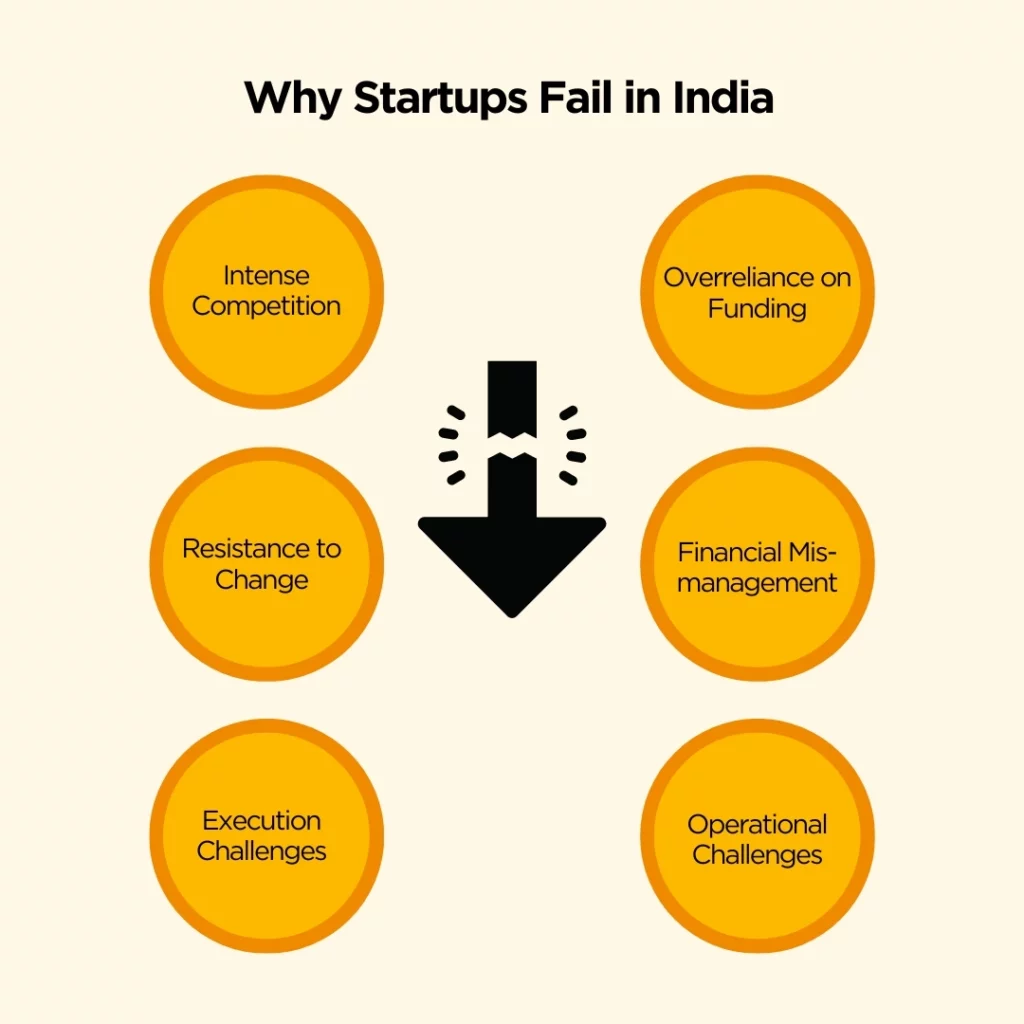
In the bustling world of startups, India has seen its fair share of success stories and failures. Today, we’ll take a closer look at some failed startups in India that couldn’t make it big, understand why they failed, and draw lessons for aspiring entrepreneurs. We compiled a list of 7 startups that failed in India and looked at why.
Learning from these failures is important. It shows that adapting and bouncing back from unexpected problems is key for new businesses. Future entrepreneurs can learn a lot from these experiences, understanding how to plan for tough times and stay flexible in a changing world. This way, they can be better prepared and have a higher chance of success in India’s ever-changing business scene.
In this overview, we will explore the following key aspects:
- Startups that failed in India
- Main Reasons Why Startups Fail in India
- How to bounce back from your Startup Failure
- Role of Production & Operations Management in Startups
Let’s begin to learn more about these in detail.
Table of Contents
List of Top Failed Startups in India
In India, failed startups aren’t just numbers. They’re stories of dreams that didn’t come true. Among many successful ventures, some stumble and fade away. Unsuccessful startups in India struggle with issues like funding, competition, and limited growth, leading to their closure. These stories show how tough it can be to succeed in the startup world. They remind us that even though some dreams don’t work out, it’s important to keep trying and learning from mistakes for the future.

Dazo
A food & beverage startup founded by Monica Rastogi and Shashank Shekhar Singhal in 2015, unfortunately closed its operations in 2016. Once a promising food-tech startup, Dazo aimed to simplify meal ordering through its app. However, it faced operational challenges and stiff competition, leading to its closure.
Failure cause
The main reasons for its failure were an unsustainable business model, Inadequate funding, and struggles with scaling up.

PepperTap
PepperTap entered the on-demand grocery delivery market but encountered challenges. They found it expensive to run their operations, with numerous companies competing for customers. Owing to their efforts, they couldn’t keep up and eventually had to shut down. The high costs and intense competition made it difficult for PepperTap to sustain itself in the market.
Failure cause
The business, despite early success, failed to become profitable and subsequently shut down due to a lack of technological resources.

DUX Education
An ed-tech startup founded in 2020 by Rohit Jain and Udit Chaturvedi, closed in April 2023 due to insufficient funding. It provided online tutoring for K-12 students. DUX Education, funded by investors, aimed to transform education through personalized learning. However, it faced challenges due to strict regulations and strong competition in the market. With financial support, the company struggled to adapt and capture enough attention. This highlights the importance of flexibility and strategic planning in the education sector.
Failure cause
Poor management and failure to adapt to changing market dynamics contributed to its downfall.

WeTrade
A Bengaluru crypto platform, closed in 2023 due to strict regulations and market instability. Launched in 2022 to simplify cryptocurrency trading, WeTrade faced funding challenges and uncertain market conditions. Consequently, it ceased operations, leading to the layoff of all employees.
Failure cause
Inadequate market research and it struggled to differentiate itself and generate sustainable revenue.

Stayzilla
Stayzilla, an online hotel booking platform, highlights the challenges faced by failed startups in India. Seeking funds, it couldn’t cope with fierce competition, showing the need for adaptability and good management. It failed to stand out and innovate, closing down amid the crowded market’s challenges. Stayzilla’s collapse serves as a lesson on the vital role of flexibility and effective leadership in staying afloat in the dynamic online business landscape.
Failure cause
The company’s problems worsened due to poor planning and bad management decisions, showing they didn’t think ahead strategically or handle things properly.

ShopX
ShopX ventured into digital commerce, focusing on rural markets by integrating online and offline retail. Initially promising, the startup encountered difficulties in expanding its operations, leading to its closure in 2019. Efforts to connect with rural consumers were made, yet ShopX faced challenges that hindered its scalability, ultimately contributing to its shutdown.
Failure cause
The project failed because people didn’t adopt digital changes quickly and there wasn’t enough money for steady growth, causing it to collapse. Therefore, It came into the list of the top failed startups in India.

Doodhwala
Doodhwala offered doorstep delivery of dairy products but faced challenges in operations and achieving profitability. The company focused on delivering fresh milk, along with other essential items, directly to customers’ homes. However, it had problems making enough money and running smoothly. Although many people liked their service, they couldn’t do well in the competitive market. It was hard for them to manage their delivery and make a profit. They tried to fix things but still struggled to compete with other companies. Doodhwala faced a downfall in 2019 due to poor management and excessive cash burn with inadequate record-keeping. The startup eventually announced its closure, citing unfavorable circumstances as the reason for shutting down.
Failure cause
The company faced challenges due to inefficiencies and strong competition from Big Basket and Grofers. This caused its market position to drop and made continuing operations hard. As a consequence, the company became one of the startups that failed in India.
These failed startups in India teach us the importance of smart planning, adaptability, and strong leadership. Each closure is a lesson for entrepreneurs.

Why Startups Fail in India: Main Reasons Simplified
In India, startups face challenges leading to failure. Let’s explore why. Limited funding, market competition, and poor planning are among the key reasons. Here, we simplify the main reasons behind failed startups in India.

- Lack of Market Research: Startups often fail due to a lack of thorough market research. Understanding consumer needs and preferences is critical for developing products or services that resonate with the target audience.
- Resistance to Change: Businesses struggled because they didn’t go with the flow of the market. Being inflexible caused them to lose opportunities. Changing and staying flexible is super important to be successful.
- Execution Challenges: Poor execution, including ineffective marketing strategies and product development, hindered startup growth and success.
- Overreliance on Funding: Startups that relied solely on funding without a sustainable revenue model struggled when funding dried up.
- Leadership Issues: Weak leadership, internal conflicts, and a lack of vision undermined startup success, hampering strategic decision-making.
- Financial Mismanagement: Poor financial planning and misallocation of funds led to financial distress and eventual closure for many startups.
- Intense Competition: Fierce competition from established players made it difficult for startups to gain market share and differentiate themselves.
- Operational Challenges: Issues related to logistics, supply chain management, and operational inefficiencies plagued several startups. In the fast-paced startup world, overcoming these challenges is crucial for scaling successfully.
Bouncing Back From Your Startup’s Failure
Facing startup failure is tough, but it’s not the end. Firstly, reflect on what went wrong and learn from it. And, stay positive and resilient. Additionally, network with mentors and other entrepreneurs for advice and support. And, learn from your previous ventures to improve your next one. Thus, consider taking a break to recharge before diving back in. Remember, many successful entrepreneurs face setbacks before finding success. So, failure is just a temporary setback on the path to your ultimate goal.

Here are some revised and corrected points for recovering from a startup failure:
- Take time to analyze the reasons for failure and learn from mistakes to avoid repeating them in future ventures.
- Be willing to pivot and adapt your business model based on market feedback and changing trends to stay relevant.
- Optimize everything from product to customer acquisition for efficient execution, driving growth and success across your business.
- Gather feedback from stakeholders, customers, and industry experts to gain valuable insights and perspectives. This helps you stay aligned with what people want and ensures continuous improvement.
- Surround yourself with a talented and dedicated team that shares your vision and complements your skills to foster innovation and collaboration.
- Validate your ideas through lean methodologies and bootstrapping before seeking external funding to ensure market demand and viability.
- Understand that failure is a natural part of the entrepreneurial journey and use it as an opportunity for growth and self-improvement.
- Utilize your network by seeking guidance from mentors, collaborating with peers, and engaging with fellow entrepreneurs to explore opportunities and gain valuable support for your entrepreneurial goals.
Role of Production & Operations Management in Startups

In startups, production and operations management is important for smooth operations and resource optimization. Production management focuses on making products efficiently, minimizing waste, and maintaining quality. Meanwhile, operations management takes care of the big picture, handling the entire business process, from getting supplies to making customers happy.
For startups, getting these aspects right is crucial. It means making products on time without wasting resources and keeping the overall business humming along. By using smart planning and technology, startups can save money, work more efficiently, and make customers smile. In a nutshell, production and operations management are the secret weapons that help startups grow and succeed in the business world.

Let’s Summarize
Failed startups in India are lessons in entrepreneurship. They’re not roadblocks but stepping stones, offering valuable insights. Understanding their reasons helps in learning and growth, turning setbacks into opportunities for success.
Each unsuccessful startup in India tells a unique story, shedding light on the challenges that entrepreneurs face. These stories offer insights into the difficulties of the startup landscape, providing a valuable roadmap for aspiring business owners. Accepting failure as a part of the journey allows entrepreneurs to approach challenges with resilience and determination. Instead of viewing it as the end, consider failure as a crucial phase in the path to future success.
So, for anyone stepping into the world of startups in India, remember: Learn from failures, adapt, and use them as stepping stones toward your ultimate success.
FAQs
How many startups fail in India?
In India, many startups struggle and eventually fail because they face challenges like not understanding the market well, not having enough money, facing tough competition, and dealing with government rules.
Studies show that about 90% of startups don’t make it past five years. Starting a business is tough, especially in India, where these hurdles are common, making success a big challenge for many entrepreneurs.
What happens when startups fail?
Startup failure can lead to financial losses for founders, investors, and employees. However, it also provides valuable learning experiences that can inform future ventures.
Did you know facts about startups in India?
India ranks among the top five countries for startup activity globally. Bangalore, Mumbai, and Delhi are the primary hubs for startups in India.
The Indian government has launched various initiatives to support and promote entrepreneurship, such as Startup India and Atal Innovation Mission.
What is the safest business to start?
There’s no one-size-fits-all answer, as the safety of a business depends on various factors such as market demand, competition, and regulatory environment. However, businesses with proven demand, recurring revenue models, and low overhead costs are relatively safer.
Why did Doodhwala fail?
Doodhwala faced challenges with operational inefficiencies, including issues with supply chain management and customer retention. These factors ultimately led to its failure in the competitive milk delivery market.
What industry has the highest failure rate for startups?
Industries with high levels of competition and regulatory complexities, such as e-commerce, food delivery, and fintech, tend to have higher failure rates for startups.
What’s behind the failure of most startups?
The failure of most startups can be attributed to a combination of factors, including a lack of market differentiation, poor financial management, operational challenges, and intense competition.
According to a study conducted by the IBM Institute for Business Value, 91% of startups fail within the first five years and the most common reason is lack of innovation. Successful startups often learn from these failures and adapt their strategies accordingly.



